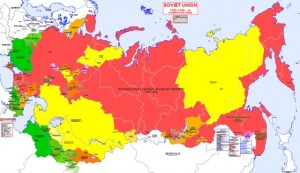Karl Marx writes on how the revolution of the proletariat will bring down national boundaries, and that class will unite and bring people together in the same way that nations did in the past. With a land mass as extensive as the Soviet Union had, the number of cultures, languages, and traditions are nearly infinite. However, the problem that the Bolsheviks faced was that they needed to unite the peasants in some manner to get them to overthrow the tsarist regime, so they attempted to unite under a common Russian identity. The major ethic groups such as the Tatars, Chuvash, and Caucausian peoples wanted to keep their traditions which had been in place for centuries if not more. ((Slezkine, 421)) Clearly they wanted to stand up against this, but the nationwide reforms the Soviets sought to put into place required some basic language or national unity for efficiency’s sake.
This quickly deteriorated into a very pro-Russian ethnic idea. It was epitomized by a man who was Georgian by birth, Stalin. The people who were not Great Russians were the victims of tsardom, and were backwards, and in order to reverse this backwardness, they needed to be educated by the party in all aspects of life. They would have to, “Develop and strengthen their own Soviet statehood in a form that would correspond to the national physiognomy of these peoples.” ((Slezkine, 423)) The Soviets met all of these cultures at the middleground, they allowed them to preserve their languages in things such as their courts and arts, but bow down to Soviet dominance in other aspects of life.
This is not to say that the Soviet Union made it easy for these cultures to survive, the process for a language to become official was extremely arduous. The failure to go along with Stalin’s policies or the party line would end in harsh punishments for that group.
With the large groups of nationalities, controlling them according to the needs of Stalin and the party was always going to be a harder task, especially when some of them do not feel the need to contribute back to Moscow.
Yuri Slezkine, “The USSR as a Communal Apartment, or How a Socialist State Promoted Ethical Particularism,” Slavic Review, 53, 2, 414-452

